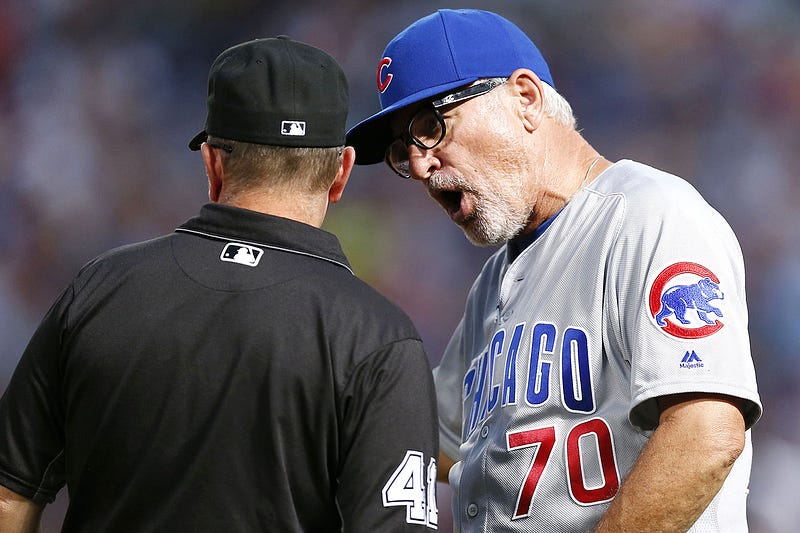The Case for More Challenges in Baseball – The Ringer (blog)
The Case for More Challenges in Baseball
We want the tantrums over balls and strikes

I imagine that Major League Baseball still uses a lot of fax machines. I don’t know this for a fact, but I like to think that for every dugout phone, there is a big, gray box nearby constantly cranking out missives from commissioner Rob Manfred; that if you walk into the league’s New York headquarters, the air is filled with the crick-crick-crick of dozens of machines sending teams marching orders as dial-up modems blare like the ghosts of America Online past. (My mom once called AOL support to ask how to turn the dial-up sound off, and the guy she reached told her he’d always thought the tune sounded like electric whales serenading each other in the dark. She left it on.)
Anyway: This is the kind of thing I think of when MLB does something grumpy and dry, like sending managers a memo last Friday to order them to stop challenging balls and strikes, which has historically been prohibited and grounds for automatic ejection.
“This highly inappropriate conduct is detrimental to the game and must stop immediately,” Joe Torre wrote in a memo obtained by the Associated Press announcing that managers and coaches who are ejected in such cases will now be disciplined, including at least a fine. “… Although disagreements over ball and strike calls are natural, the prevalence of manager ejections simply cannot continue. This conduct not only delays the game, but it also has the propensity to undermine the integrity of the umpires on the field.”
Torre is the league’s chief baseball officer, simultaneously both the best and worst C-suite title out there (wish they could have sent Joe down to Battery Park in Mr. Robot, amirite?). That means his job is to think about baseball, the sport. I also think about baseball, the sport — if you are reading this, I bet you probably do, too — but it is Torre’s responsibility to contemplate baseball’s aging soul and, among other things, try to make it more exciting and welcoming and inclusive.
The thinking behind preventing managers from questioning ball-and-strike calls is that plate umpires are usually correct, and that permitting challenges to catch their occasional errors would dramatically slow the game. This issue has grown thornier in recent years as the game has increasingly relied on in-house instant replay technology to help resolve other, permitted challenges. Video tech also happens to make it much easier for managers to know whether a called strike was actually a strike and thus: the sudden prominence of illicit, replay-backed disputes. There has been a spate of them this season, notably Tigers manager Brad Ausmus throwing a fit that culminated in him covering the plate with his sweatshirt. (Like a burial shroud? To keep it warm? Unclear.)
Torre’s memo was a reminder to managers that such behavior is not, in fact, allowed. He will not stand by and watch, he has made clear, the creeping End of Fallibility as robots perfect our sports, take our jobs, etc. But listen here, Joe, Mr. CBO, sir: Do not stop the tantrums over balls and strikes. Long live challenges. May ejected managers inherit the earth. We can rebuild it*. We have the technology**.
(*Fun, in baseball, not an oxymoron, trust me, I promise.)
(**LITERALLY WE HAVE THE TECHNOLOGY TO MAKE BASEBALL MORE FUN.)
Do managers’ complaints add extra time to games? They do! They sure do. And will formally allowing managers a whole new thing to complain about introduce additional pauses? Certainly! MLB has been fretting about game length for years on the basis that the sport’s inherent longness — or what a non-baseball fan might call its lazy, dragging, sunburn-inducing boringness — discourages fans (or, more significantly, would-be fans) from paying attention to the league. In 2015, MLB instituted a host of pace-of-play rules that successfully trimmed an average of six minutes off of major league games. There’s nothing like a puffy, red-faced grandpa bod huffing and puffing his way out of the dugout to really throw a wrench in gameplay.
But listen to this crowd! Listen to it! Do those people sound bored? Do they sound like they’re turning to one another and saying, My god, Paul, I paid to watch a baseball game, for crying out loud, and now I am watching a fat man yell in his pajamas? Is that what those cheers sound like to you, Joe?
Look at this spittle-spattering! This halitosis-harkening! This stomp-stationing(?)! Is this boring? Is this game too slow? Here is Red Sox manager John Farrell — mad, raving, gesticulating! — being told to depart in May after challenging a bad strike call, shortly before David Ortiz got the boot for doing the same thing:
Goddamnit, baseball, this shit is great, OK? Leave it alone. Manager tantrums are not only an old tradition — they’re a great one. If the end result of pace-of-play guidelines is to make baseball more exciting — well, hell, this sure seems exciting to me. And this is to say nothing of the fact that everyone with access to any kind of electric whale serenade knows immediately whether a ball-and-strike call was blown. We don’t need to hand the whole game over to rule-minding cameras and robots to acknowledge that this is clearly a specificity that fans enjoy.
Yes, baseball could benefit from being sped up, and yes, the league should be working hard to attract and engage with new fans. But if MLB’s goal is to make the sport more exciting, for the love of god, don’t rid us of an outlet for one of the most delightfully weird and thrilling things baseball has to offer.






